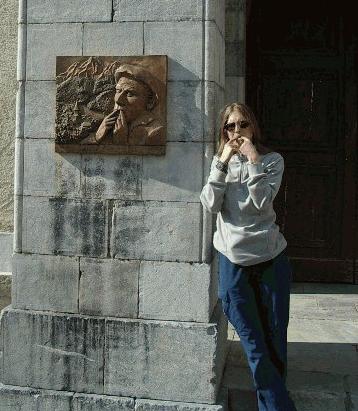The Pyreneans whistlers
| On the French hillside of the Pyrenees , the inhabitants of the village called Aas were used to whistle to communicate over long distances. The language: the whistled Béarnais Ossalois has disappeared today. |
| This is a sample of whistling recorded by Pr. Busnel in the 60's. |
| We met René Arripe at his place in Laruns (3 km away from Aas). This land child and writer of “The whistlers of Aas” confirmed to us that the last whistler was dead four years ago. We had a walk through the village where people told us the same: |
  |
-Good morning Sir! What a nice valley by this sunny weather! What interested us was to test our recording material in the valley where this linguistic phenomenon had developed. As you can see on the following pictures the valley is a perfect acoustic channel allowing whistled communication between the pastures and the village. |
Neighbors of our friend Romain Piro told us, as already did Pr. Cowan (cf. Mazatecs in Mexico ), that in the Basque country they had heard some whistled language. We checked this out and learned that instead of whistling it was the Irrintzina: a Basque high pitch shouting used to express feelings. |
-Adischatz! (Goodbye in Béarnais language).
|
The Basque country
THE IRRINTZINA, shout of enjoyment and wrath
Shepherds and people hanging around in the Basque Mountains used the Irrintzina to express a feeling. It could be the enjoyment to be back to the house they had left to lead sheep through the mountain at the beginning of summer, or the expression of a love feeling towards their fiancée, or even a shout of wrath and rage against a criminal. The range of irrintzinas , never listed, is as wide as the range of human feelings.
In Euskara (the Basque Language), “irrintzina” means a neigh; and the root “irri” means laugh. So the irrintzina is the perfect compromise between an animal shout and the expression of a human feeling!!
We know that many mountain dwellers in the world had developed and kept some very atypical communication forms perfectly adapted to mountainous landscapes. In high-Béarn for example, the inhabitants of Aas daily used a whistle to communicate until the 50's. It was a way to transmit whole messages between the pastures and the tops around. The irrintzina can only express feelings.
At the beginning of the 20 th century, these who described the irrintzina because they often heard it in the mountain, told about a cluck which for example was used at the beginning of village celebrations. An Englishman evocated a shout which was: “both a horse neigh, a wolf howl, ending with a bray on the last notes.” The great traveller Violet Alford studied the irrintzinas comparing it to the other shouts of Pyreneans mountain dweller .She said “the South Basque country shouts are less frightening than in the North”.
Pierre Loti too had an occasion to hear the irrintzina in the Labourdine Mountains : “it rises very shrill and frightening in the air. It fills the air and tears the distant. It is part of very high notes which ordinary belongs to the women with something hoarse and powerful inside which indicate savage male. It has the wild dogs voices' caustic. ( Ramuntcho )
The Basque people also play a flute whose was traditionally played along street theater and singing:
The TXISTU looks like a flute; it produces some entangling sounds. Most of the time music is linked t the singing, dance and some forms of street theatre. The txirülari (souletins flute Player) play along the pastoral spectacle, sang remaining of the Middle-age Mysteries. The txirülari would not be able to be away from the fest.
So, we finally did not found any whistled language in the Basque country but close phenomenon which permit a better understanding of whistle languages.


